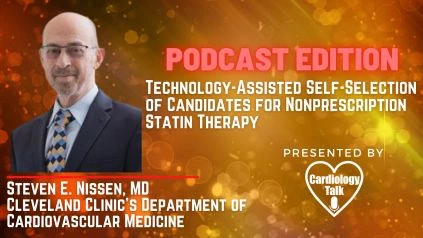Podcast- Steven E. Nissen, MD- Technology-Assisted Self-Selection of Candidates for Nonprescription Statin Therapy
Steven E. Nissen, MD, is the Chairman of the Cleveland Clinic's Department of Cardiovascular Medicine and a Professor of Medicine at Case Western Reserve University's Lerner College of Medicine. He was President of the American College of Cardiology (ACC). In this video Dr. Nissen discusses Technology-Assisted Self-Selection of Candidates for Nonprescription Statin Therapy.
Link to Abstract-
https://www.jacc.org/doi/10.1016/j.jacc.2021.06.048
Abstract-
Abstract
Background
Despite the fact that statins lower cardiovascular morbidity and death, only about half of those who are eligible receive them. Consumer access to statins that is safe and acceptable could have a large positive public health impact.
Objectives
Using a technology-assisted approach, this study compares the concordance between a participant's and clinician's assessment of statin therapy eligibility.
Methods
A total of 500 people, 83 of whom had limited literacy, completed an at-home Web-based application to see if they were eligible for rosuvastatin 5 mg medication. The Web tool is designed to determine whether a patient is eligible for a moderate-intensity statin based on current guidelines and to refuse access to those who have rosuvastatin contraindications. Following that, participants went to a research site where physicians did an independent Web application assessment while being blinded to the information they had entered. The Web application is set up to respond to one of three rosuvastatin therapy scenarios: "OK to use," "not right for you," or "see a doctor." The primary outcome was the percentage of participants whose self-selected eligibility for nonprescription rosuvastatin matched clinician evaluation.
Results
In the primary endpoint, participant selection for statin therapy was consistent with clinician selection in 481 (96.2%) of 500 participants (95 percent confidence interval: 94.1 percent -97.7%), with 23 (4.6%) deemed appropriate for treatment and 458 (91.6%) deemed inappropriate. In three situations, self-selection was inaccurate ("OK to use"), 14 cases had incorrect rejection ("not right for you"), and two cases had an improper "consult a doctor" conclusion.
Conclusions
Consumer self-selection for statin medication using a technology-assisted strategy resulted in significant agreement between participant self-selected and doctor selection.



